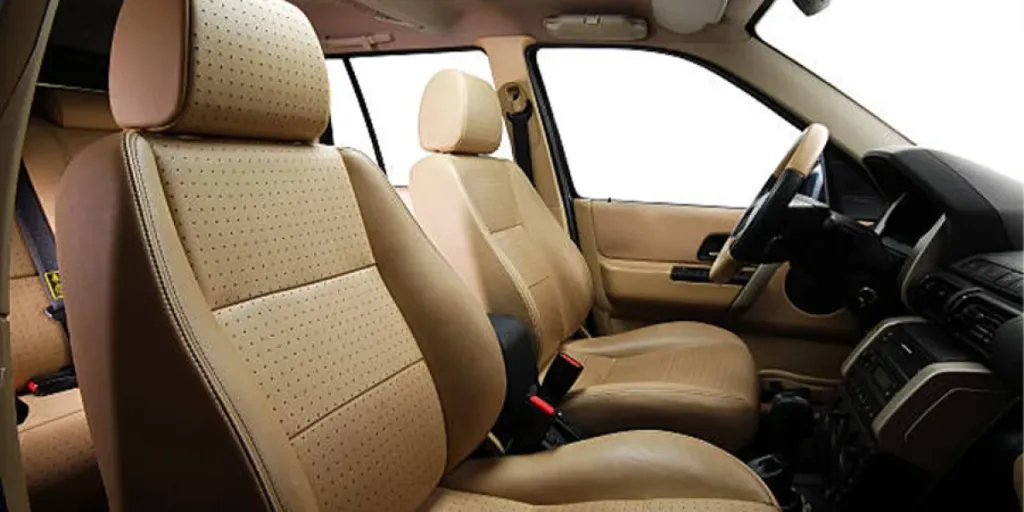The engine air filter is a critical part of a vehicle. It cleans contaminated air before it gets to the engine. Many drivers are unaware of the importance of clean air filters; some believe they can clean them instead of replacing them.
Engine air filters play an important role in helping car engines breathe freely, and a dirty air filter will significantly reduce a vehicle’s performance.
Small businesses and retailers selling engine air filters should understand the importance of timely engine air filter replacements to advise their customers and boost sales. This article looks at everything you need to know about engine air filter replacement and why it matters.
Table of Contents
Market overview of engine air filters
Types of engine air filters
How often should one change an engine air filter
Signs an engine filter needs replacing
1. Reduced fuel efficiency
2. Check engine warning light
3. Weird noises
4. Black smoke
5. Misfiring and starting issues
Benefits of replacing an engine air filter
The bottom line
Market overview of engine air filters

With more people buying vehicles, there is a growing need for vehicle parts, including engine air filters. According to Fortune Business Insights, the global automotive air filter market was valued at USD 9.20 billion in 2024 and is expected to reach USD 16.45 billion in 2032, growing at a compound annual growth rate (CAGR) of 7.5%.
The demand for automotive filters and, more so, engine air filters is driven by increasing vehicle production. As more people become environmentally conscious, governments are pushing for stringent emission regulations.
Additionally, a growing awareness of air pollution and its impact on health has led to a demand for high-performance air filters. A need for improved engine performance and fuel efficiency has also increased the demand for engine air filters.
Types of engine air filters
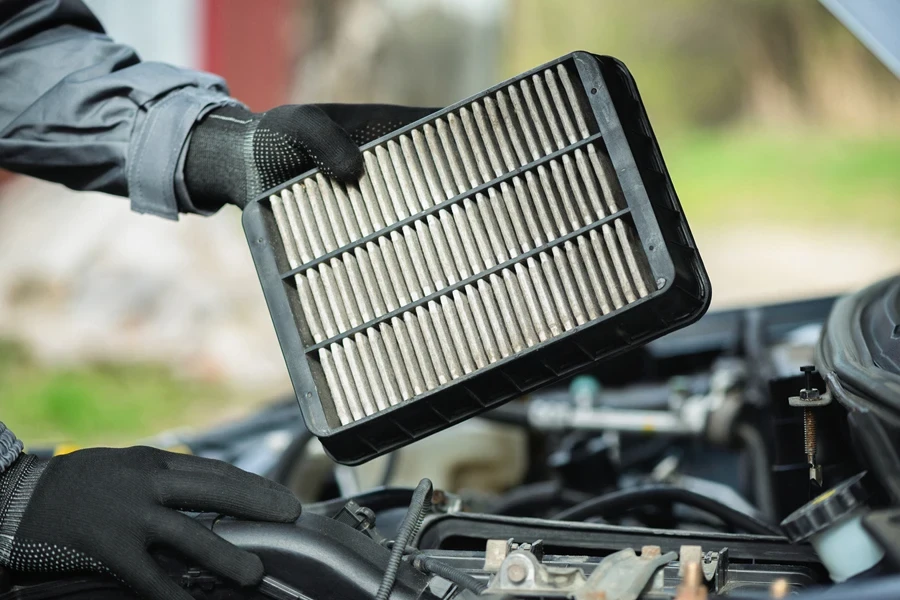
Engine air filters stop dirt and debris from getting to the car engine. They come in different materials and shapes. There are panel-like, round, conical, or radical car engine air filters with rigid or flexible frames.
The filtering media can be either paper, foam, or synthetic materials.
Paper filters: Paper engine filters are the most common and cost-effective options. They are designed for standard vehicles and everyday driving conditions.
Foam filters: These are made for off-road vehicles, small engines, and motorcycles. They are longer-lasting and can handle extreme dirt and dust exposure. Foam engine filters are lightweight, have a porous structure, and are easy to clean.
Synthetic or synthetic blend filters: These filters are made of synthetic materials, have an increased filtration capacity, and are more durable. They trap smaller particles more efficiently than paper filters. Compared to paper filters, synthetic filters are more resilient to moisture, heat, and chemicals. A high-quality synthetic filter helps balance airflow and filtration efficiency.
How often should one change an engine air filter
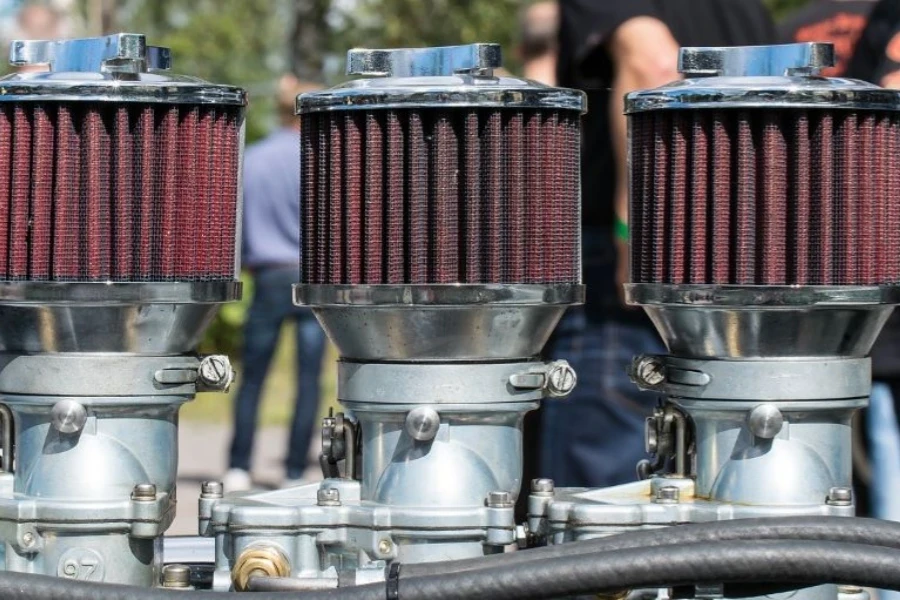
Not all drivers know when to change their engine air filters. Most manufacturers recommend changing your air filters at least every 12,000 to 15,000 miles or once a year, whichever comes first.
While this is the general rule, the frequency of replacing an engine air filter may vary depending on various factors:
1. Driving conditions: Customers who drive on dusty roads, in rural areas, or in polluted areas may need to replace their car engine air filters more often.
2. Environment: Customers who come from regions with high pollen concentrations, sand, and debris will need to change their air filters often, as these increase the filter’s workload.
3. Vehicle type: The customer’s vehicle type will determine how often they change their air filters. Performance and off-road vehicles need specialized filters and may have different maintenance schedules.
Retailers should emphasize the importance of checking the car’s owner’s manual to determine the right replacement schedule and other recommendations for driving conditions.
Signs an engine filter needs replacing
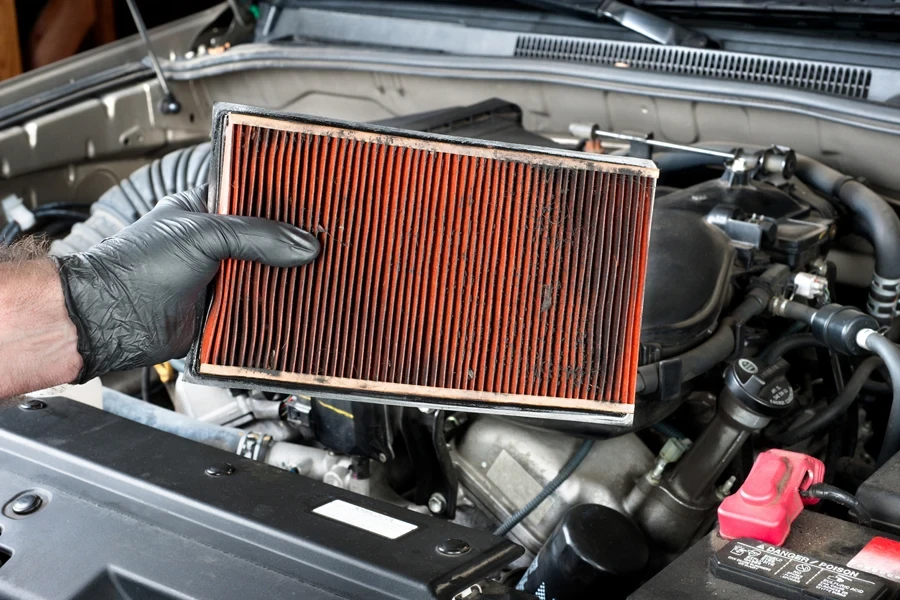
Many drivers believe they should change their engine filters when visibly dirty. Dirt is not the only sign your engine air filter needs replacing. Some of the other signs to change car filters your customers should look out for include:
1. Reduced fuel efficiency
When your customers start visiting the gas station more often, their vehicle has a decreased gas mileage. When the air filter gets dirty, it will constrict the air getting into the engine, making it work harder and burn more fuel.
2. Check engine warning light
The check engine warning light tells a driver when their engine has a problem. Many factors, including a clogged engine air filter, can trigger the warning light. A clogged air filter reduces the engine’s performance, leading to slow acceleration, which may trigger the warning light.
3. Weird noises
A vehicle engine should hum. However, if the engine is not getting enough air, it will start making weird noises. If your customer’s car makes funny noises like sputtering, coughing, or popping sounds from the engine, it is time to replace the engine air filter.
4. Black smoke
If your customers complain about black smoke from their exhausts, it is time to change their car air filters. Black smoke shows a higher proportion of fuel to air in the engine. Without enough air, the fuel will not burn completely before the exhaust stroke pushes it out of the combustion chamber, leading to black smoke full of unburned fuel.
5. Misfiring and starting issues
If the customer’s car is misfiring or hard to start, its engine air filters may need changing. Misfiring and a lack of acceleration power are caused by inadequate air in the engine due to a dirty air filter.
Benefits of replacing an engine air filter
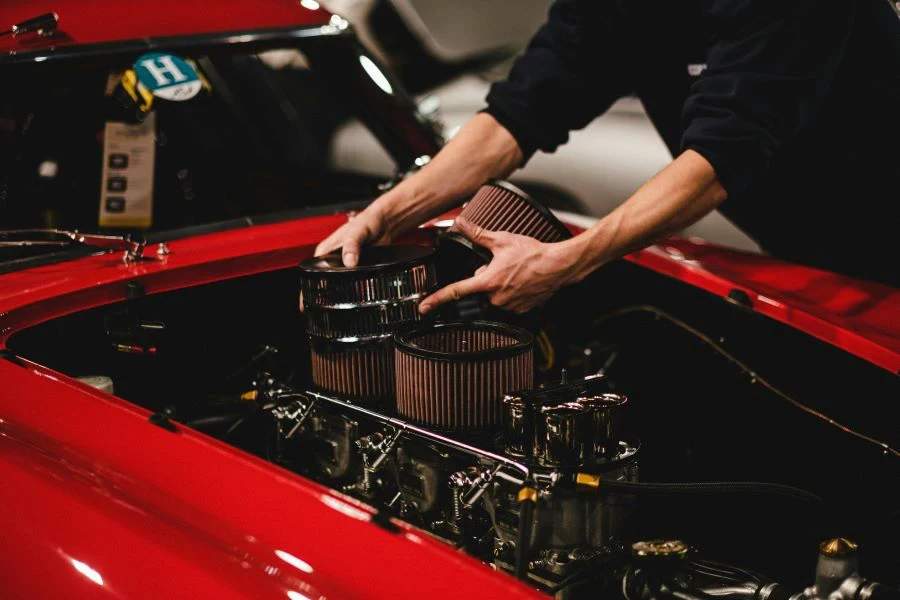
Engine air filter replacement can improve a vehicle’s performance and lifespan. If your clients ask why replacing it matters, here are a few benefits.
- Better engine performance: A clean airflow allows the engine to run smoothly with strain.
- Boost fuel efficiency: A clean air filter ensures complete fuel combustion, helping drivers reduce fuel costs.
- Prolonged engine life: A clean air filter keeps the debris and dirt out of the engine, making it have less wear and tear, prolonging its life, and reducing costly repairs.
- Reduced emission: Clean air filters contribute to a healthier environment by reducing harmful emissions.
The bottom line
Replacing an engine air filter may seem like a small thing, but it has many benefits for the vehicle’s performance, the owner, and the environment. Small businesses and retailers can place themselves above the competition by offering valuable information to their customers about when they should change their air filters and the signs their engine air filters need replacing.
As a small business, you have the opportunity to not only sell engine air filters but also educate your customers about the importance of regular inspection and replacement of air filters. Whether the driver is doing a DIY replacement or taking their vehicle to a professional mechanic, the goal is to make the information available and straightforward.
A clean engine air filter means a healthier, more efficient engine, which all drivers will appreciate.


